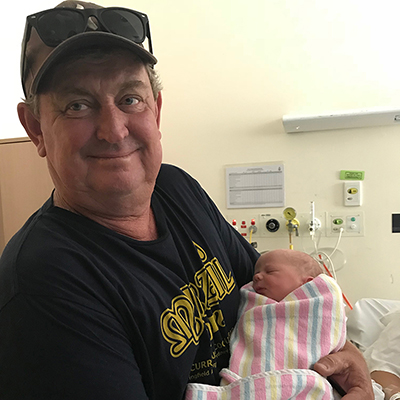Never hide your stroke symptoms
Real life story for Men’s Health Week
It’s Men’s Health Week (June 15-21), a time when men are encouraged to reflect on what it means to be healthy and what steps they can take to ensure they are looking after themselves.
Below is a blog by stroke survivor Mark Prior. Mark is from Port Macquarie in New South Wales and is the type of guy who thought he was invincible. He took pride in the fact he had not been to a GP in almost 30 years.
When Mark suffered a stroke, he went to great lengths to hide his symptoms and did not want to admit he needed medical help. His experience demonstrates how important it is to look after your health for yourself and your loved ones. Mark knows he is lucky to be alive and does not want others to make the same mistakes he did.
Stroke can be prevented and it can be treated, but you must call triple zero (000) at the first sign of a stroke.
As part of Men’s Health Week, Stroke Foundation urges the community to learn and share the F.A.S.T signs of stroke. The F.A.S.T. test is an easy way to recognise and remember the signs of stroke. Ask these simple questions:
Face – Check their face. Has their mouth drooped?
Arms – Can they lift both arms?
Speech – Is their speech slurred? Do they understand you?
Time – Time is critical. If you see any of these signs, call triple zero (000) straight away

Mark Prior’s story
Before my stroke, I hadn’t needed to visit a doctor for nearly thirty years.
I was under a fair amount of pressure at work and I hadn’t been sleeping well for a while. My wife convinced me to visit the doctor for a check-up. I was also having dizzy spells, but I didn’t tell her about those.
At the visit, the doctor found that my blood pressure was incredibly high, so I was put on medication immediately, which lowered it within a month.
I then had an episode where my hand became so numb I needed to go to hospital. I had blood tests and a brain scan before they sent me home. I didn’t know it was an undiagnosed Transient Ischemic Attack or TIA (sometimes referred to as a mini-stroke) at the time.
Not long after that, I got on a flight to America for a trip and tried to put the weird symptoms I’d been experiencing to the back of my mind. During the trip, I think I experienced several more TIAs. I couldn’t see properly out of my right eye and felt confused, but I didn’t mention this to anyone.
When I came home and went back to work, I bluffed my way through the day, hoping my symptoms would simply disappear on their own. I couldn’t type because my hand was not working so I made an excuse and got an apprentice to do it for me. The bluffing continued when we went out for dinner. I couldn’t use the cutlery and made up an excuse so that I didn’t have to eat. The confusion also got to the point where I couldn’t remember how to use an ATM and lied to my wife, telling her the machine had run out of cash.
The situation finally came to a head when I had to travel in the car with a workmate. They asked me if I wanted to drive, but I had to explain that I couldn’t because of my hand. It was at this point when I asked them to take me to hospital.
At the hospital, I wasn’t honest with the doctors about all my symptoms, I’m not sure why, maybe I just didn’t want to admit that something was wrong or if it was the confusion I was feeling. The doctors gave me a referral for a brain scan at a private clinic before discharging me. When I got home, my mum came over as she’d been talking to my wife who’d been updating her with what was happening. Mum came from a medical background, so she had a look at me and agreed with my wife that something was definitely not right. They called an ambulance and I went back to hospital. I was seen by the same doctor who discharged me again.
I went to my referral for my brain scan the next day and was told that I’d had a significant stroke. I took the scan results back to the hospital and was immediately admitted. By this point I was unable to read or write. The doctors operated to remove a blood clot and plaque from an artery in my neck that carries blood to my face, head and brain. I was told that if that clot had gone to my brain then I would have died.
In the months after, I had to learn how to read and write again. The care I received was fantastic.
I’m nearly back to normal now, I’m back at work but my motor skills aren’t what they used to be.
It’s strange how such an experience can change a person. I cried watching the movie “Marley and Me”; I wouldn’t have done that before my stroke.
I know how lucky I am and I will never hide a health problem again. Nothing can be gained from that.
Nobody is invincible. I don’t want others to make the mistake I made. If you think something is wrong, get it checked out by a doctor as soon as possible.
Media contact: Emily Granland m)0408 000 409 e) media@strokefoundation.org.au
